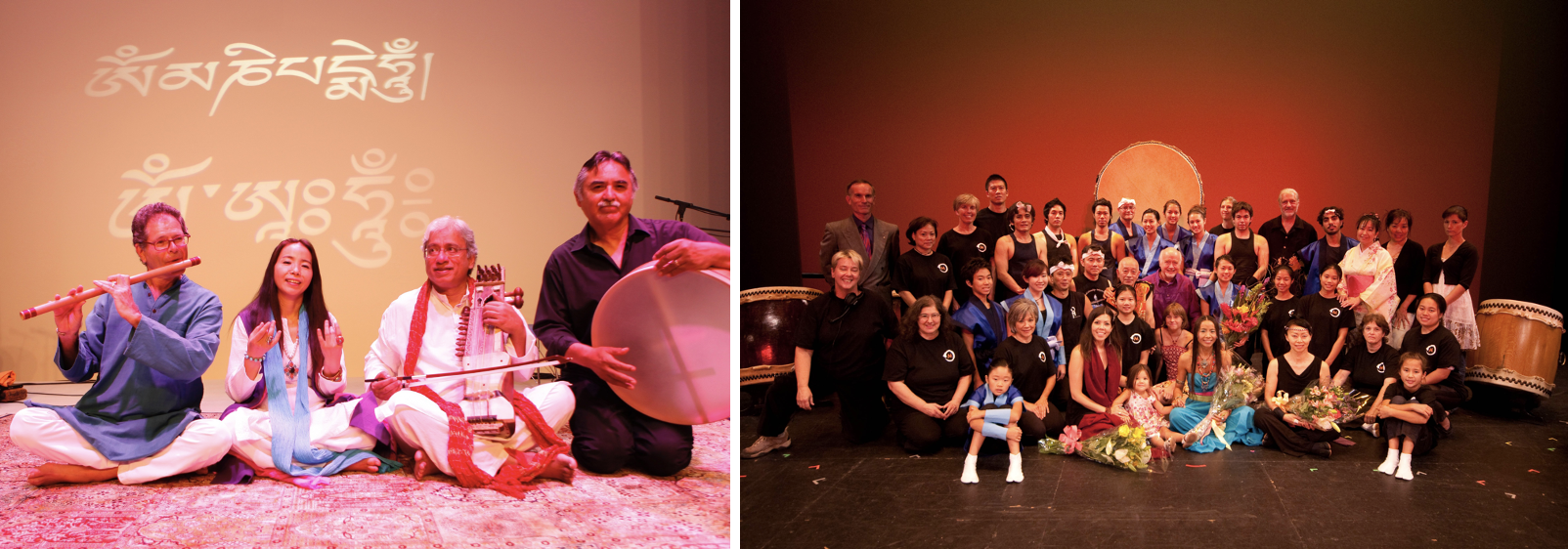
Yangjin was born in a traditional Buddhist family in Tianzhu Autonomous Tibetan County in Gansu Province. In her formative years, Yangjin was nurtured by her mom’s age-old meditation heritage and demonstrated an exceptional gift for music. When she was young, she was determined to become a monk and engaged in full-time practice. Saicang Rinpoche, Yangjin's first guru of the Gelukpa lineage, named her "Yangjin Lamu"- meaning Sarasvati (goddess of learning and the arts), and foretold that she shall benefit a lot of beings with her music.
In 1994, she left her hometown for college in Beijing. Being a young person deeply concerned about the underdeveloped Tibetan economy and inadequate education system, Yangjin was determined to support monasteries, orphans and the disabled by starting up her own business. So, she quit college, returned to her hometown, and established Qizheng Tibetan Medicine.
In the following eight years, she dedicated herself to promoting the Tibetan medicine by performing across the country. Over the years, she organized hundreds of expert seminars which led to the listing of Tibetan medicine in the National Reimbursement Drug List. With over 20 subsidiaries and hundreds of salespeople, the company became a hundred-million business.
In 1999, Yangjin Lamu was busy running the company and promoting Tibetan medicine. At the same time, she decided to promote Tibetan culture via modern Tibetan music. With her two sisters Daizang Zhuoma and LaMuCuo, she formed the Yingjinma Triad, the very first Tibetan vocal group of three biological sisters. In 2001, the Triad took to stage and performed in the CCTV Spring Festival Gala, followed by over 10 appearances around the world.
In 2001, knelt before Buddha in the Jokhang Temple in Tibet, she vowed to devote herself to promoting dharma teachings, and in case being a monk is not possible in this life, she prayed to meet a like-minded Buddhist partner who would share her mission of working for the benefit of all beings.
Soon enough, she met her Buddhist companion Mark Yuting Chen, producer of the documentary The 17th Karmapa Legend. Mark was born into a prominent and exceptionally giving family of Han ethnicity. He received an MBA from Harvard Business School, after which he spent three years as a monk in Taiwan. Like Yangjin, he is also a Buddhist with a wish to benefit all beings.
In 2002, the 17th Karmapa, with the insight from his vipassana meditation, gave the two his blessing. Two months later, Yangjin and Mark got married and embarked on a journey of practicing dharma using marriage as a path.
After Yangjin got married, her inner voice was getting louder and clearer each day - neither running a business for profit nor performing for fame was her path. In 2003, she waved goodbye the performing stage and Qizheng Tibetan Medicine Group - now a public company, and devoted wholeheartedly to dharma practice.
She has nondiscriminatory and pure faith in gurus of different lineages. She has received teachings from over ten gurus, including Drikung Chetsang Rinpoche, Khenpo Tsultrim Gyamtso Rinpoche, Thrangu Rinpoche, Yongey Mingyur Rinpoche, H.H. Gangtent Tulku Rinpoche, and Dzongsar Khyentse Rinpoche.
In 2008, at the invitation of Hanna Strong, wife of former under-secretary-general of the United Nations Maurice F. Strong, Yangjin visited Crestone Colorado and completed 3 retreats that lasted for 6 months.
During her retreats, she was able to reconnect with the dharma practice of her previous lives and trace the lineage of her dharma. While deep in meditation, she also received a complete teaching that uses music, chanting and dancing to benefit all beings. This set of methods, now known as Zen of Yangjinma, is a combination of secret practices such as perfecting the cultivation through the ear as Guanyin Bodhisattva, Qi-Meridians-and-Bindu, Dzogchen (the Great Perfection). By practicing Zen of Yangjinma, one can quickly experience a state of calmness, worry-free emptiness and happiness.
Along the journey of searching for life's answers, Yangjin found her mission - to wake people up with spiritual music. Subsequently, she recorded four albums: Yangjin – the Tibetan Voice, Dharma Flower, Tears of Yangjinma, and Words for Wish Fulfillment, among which Dharma Flower was nominated the 19th Best Religious Music Album in the traditional art category of the 19th Taiwan Music Award.
In 2008, Yangjin met the eight-time Grammy winner Paul Winter, who said that he “heard in her voice a kind of calling, from the ancient world, and from the land, calling us to listen, and to wake up. There's something very ancient and mystical about her voice. We all need this call from the Earth, and from the heritage of our ancestors..."
Yangjin was invited to perform with the Paul Winter Consort at St. John’s Cathedral, New York. The live recording won the 2011 Grammy Award for Best New Age Album, and she became the first Chinese singer with a Grammy statuette on her hands. Paul Winter said that her voice was the soul of the album, and that she should take the stage and accept the award on behalf of the Consort. Afterwards, Yangjin toured around the world with Paul Winter, from New York to New Mexico, from LA to Japan.
Later on, in order to promote spiritual music and make the genre wider known and understood, Yangjin invited many Grammy-winning musicians over to China and performed dozens of concerts together. Yangjin felt that music was a tool for helping others, so she made a wish to use music as a bridge to help invoke people's compassion and wisdom.
In 2010, Yangjin and her husband Mark Chen were invited to join the Global Philanthropist Circle (GPC). Founded and managed by the Rockefeller Family, GPC is a global non-profit organization consisted of 76 leading philanthropic families from over 20 countries. Yangjin started to work with prominent female philanthropists Peggy Dulany, Jennifer Buffet and Zainab Salbi to establish Women for Humanity, with a mission to empower women in a way that also benefits men, in order to make the world a better and peaceful place.
In May 2011, in an effort to promote China-US relations and world peace, Yangjin and Mark arranged a visit for over 20 GPC members to Mainland China and Taiwan.
In 2013, the 46-year old Yangjin Lamu gave birth to her first baby girl CHEN Ming-le.
During her pregnancy, she wrote Enlightened Female Warrior (traditional Chinese version) and the Age of Feminine Energy (simplified Chinese version), which became best sellers in both Mainland China and Taiwan. Three months after childbirth, she was invited to teach Zen of Yangjinma.
After a few sessions, she realized that her methods can quickly help people ease into samadhi and obtain a lot of experience. However, without the right view, a student may be obsessed with the experience and get sidetracked. This runs counter to the very reasons why we practice at all - to be free from the grip of emotions and pains, to get to know the inner self and work for the benefit of all beings. In light of this, she invited her dharma partner Mark Chen to teach the right view and put together a framework for practicing dharma in daily life - Consciousness and Zen of Yangjinma.
The Science of Advanced Consciousness brings science to ancient teachings, making the views and methods relevant to modern day living. Zen of Yangjinma, on the other hand, uses music, chanting, and dancing to help deepen the awareness and connection with the inner self. Together, they have guided thousands of students across the Strait along their practice at home, at work and in their day-to-day lives.
In 2018 at the age of 51, Yangjin Lamu was pregnant again, this time with triplets – CHEN Chang-le, CHEN Yong-le and CHEN Mi-le. In the process, she had to navigate through pregnancy preparation, prenatal education, laboring and raising four children, all on top of her busy work life. There came Mother Zen, her second book loaded with insights and wisdom she gleaned from the experience. It’s a guidebook that modern women can use to free themselves from suffering without having to leave their lives and work behind.
In late 2020, urged by her master, she started to create music for dharma practice, music that would help practitioner to achieve a state of calmness, heightened consciousness, and oneness with the dharma. Yangjin practices dharma with everything she does in life. She is a Buddhist musician who practices tirelessly each day for the benefit of all beings. She is also a wife and mother who always lives in the moment with calm and joy.













